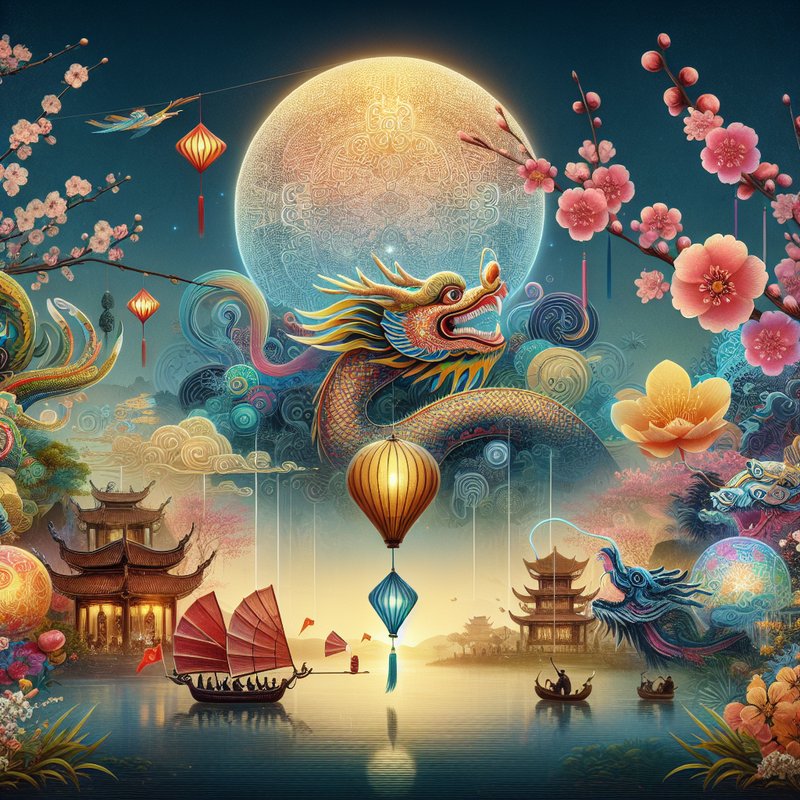Cultural Significance of Traditional Festivals in Vietnam

The traditional festivals of Vietnam play a crucial role in preserving the country’s rich heritage and culture. These festivals are not merely festivities; they represent the values, beliefs, and traditions of various ethnic communities. Each festival tells a story, often reflecting local history, agricultural cycles, or religious practices that have been passed down through generations.
Through these vibrant celebrations, communities can come together, strengthen their bonds, and foster a sense of identity and belonging. The festivals also attract tourists, offering a glimpse into the diverse lifestyles and customs of the Vietnamese people, encouraging cultural exchange and understanding.
Notable Traditional Festivals Across Vietnam

Vietnam is home to a multitude of traditional festivals, with each region boasting its unique celebrations. For instance, the Tet Nguyen Dan (Lunar New Year) is the most celebrated festival, marking the arrival of spring. It is a time for family reunions, paying respects to ancestors, and partaking in various customs such as making traditional foods and exchanging greetings.
In North Vietnam, the Huong Pagoda Festival attracts thousands of pilgrims every year who embark on a spiritual journey to the sacred pagodas. This festival, held in the picturesque Huong Son mountains, involves a pilgrimage along the scenic river, culminating in rituals at the pagodas that symbolize spiritual purification and devotion.
Meanwhile, in the Central region, the Hue Festival showcases the heritage and culture of the ancient capital. This biennial event is a grand celebration of art and tradition featuring vibrant performances of traditional music and dance, elaborate costumes, and exhibitions that highlight the rich history of the former imperial city. The Hue Festival not only honors the cultural legacy of Vietnam but also attracts artists and performers from around the world, fostering a spirit of cultural exchange.
Each festival offers a unique experience that is deeply rooted in Vietnam’s cultural landscape, providing visitors with an opportunity to engage with the local communities and gain insight into the country’s diverse traditions.
Unique Customs and Traditions During Festivals

Each traditional festival in Vietnam is characterized by distinct customs that highlight the creativity and artistry of the Vietnamese people. Elaborate decorations, colorful costumes, and traditional music are integral aspects that make these events truly unforgettable. For example, during the Tet festival, homes are adorned with peach blossoms in the north and yellow apricot blossoms in the south, symbolizing prosperity and happiness.
Furthermore, traditional games and folk performances often take center stage during Vietnam’s festivals, encouraging lively participation from both locals and tourists. Events like the exhilarating dragon dance, where performers mimic the movements of a dragon to the rhythm of traditional music, create an atmosphere of joy and camaraderie. Alongside these stunning displays are folk games such as tug-of-war and sack races, which not only entertain but also strengthen community bonds as participants cheer each other on.
In addition to games, traditional art exhibitions featuring local crafts, calligraphy, and performances of folk music enrich the festival experience. These activities provide a glimpse into the artistic talents and cultural heritage of the Vietnamese people, inviting attendees to engage with the customs and creativity that define their communities. The shared laughter and excitement transform the festivals into unforgettable celebrations of life and culture, leaving both locals and visitors with cherished memories.
Planning to Experience Traditional Festivals in Vietnam

For travelers looking to experience Vietnam’s traditional festivals, proper planning is essential. Understanding the festival dates, cultural etiquette, and the best locations to immerse oneself in the celebrations can greatly enhance the experience. Many festivals occur at specific times of the year, particularly around the lunar calendar, so it is wise to research in advance to avoid missing out on these vibrant events.
Engaging with local communities during festivals in Vietnam is not just an enjoyable experience; it’s a gateway to understanding the heart and soul of Vietnamese culture. As travelers immerse themselves in the celebrations, they become part of the collective joy that these festivals bring to communities. By participating in activities such as traditional games, dance performances, and processions, visitors have the opportunity to connect on a deeper level with locals who are eager to share their customs and stories.
Travelers are encouraged to embrace the vibrant customs encountered at these festivals. Trying traditional foods, for instance, provides insight into local culinary heritage and often fosters a sense of camaraderie among festival-goers. Respecting cultural practices and showing appreciation for the rituals performed can enhance the overall experience, as it demonstrates a genuine interest in the traditions that shape the identity of the community.
Ultimately, these interactions create memorable experiences, allowing travelers to leave with not just photographs, but also friendships and a profound respect for the Vietnamese way of life. Participating in festival activities can transform a mere visit into a meaningful journey filled with unforgettable memories.

Leave a Reply